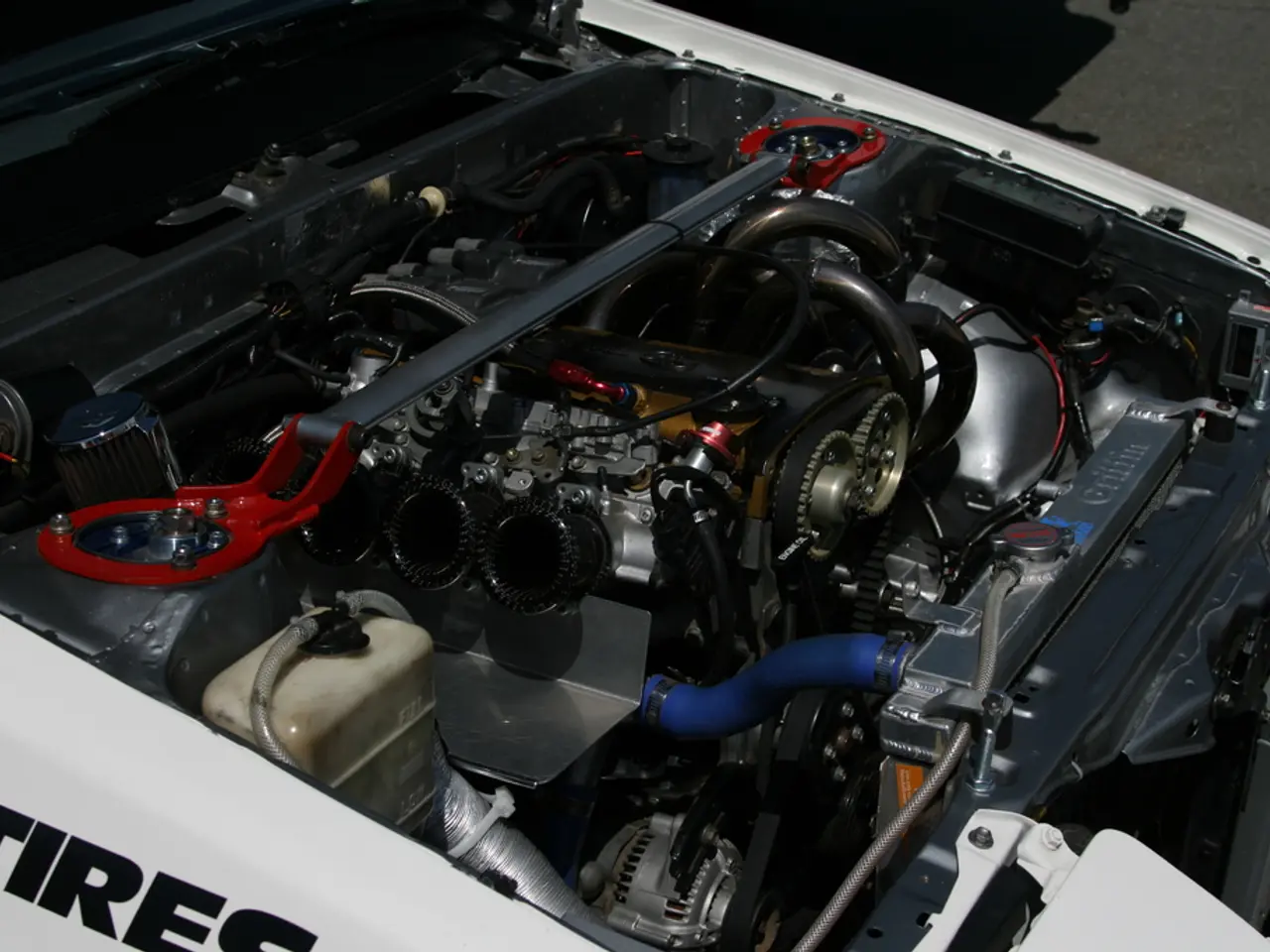Decarbonizing Technology Presentation by Cummins and Accelera, Spotlighting Their Comprehensive Hydrogen-Oriented Solutions
Cummins Inc., a global power technology leader, is making significant strides in the realm of zero-emission solutions. Through its subsidiary, Accelera, the company is providing a diverse portfolio of technologies aimed at decarbonizing various industries. This includes batteries, hydrogen fuel cells, ePowertrain, traction drive, and electrolyzers [1].
Accelera's President, Amy Davis, has highlighted the company's electrolyzer technology as a key component in scaling hydrogen production infrastructure to support hydrogen-powered vehicles [2]. This emphasis on hydrogen technologies forms part of Cummins' strategy to reach zero emissions by 2050, known as Destination Zero [1].
Hydrogen Fuel Cells and Hydrogen-Fueled Internal Combustion Engines (H2-ICE)
Accelera is actively advancing hydrogen-focused decarbonization technologies, primarily in two areas: hydrogen fuel cells and hydrogen-fueled internal combustion engines (H2-ICE) [1].
The hydrogen fuel cell technology is aimed at powering medium- and heavy-duty trucks, with a significant project underway involving a 100-megawatt PEM electrolyzer for bp's Lingen green hydrogen initiative in Germany. This initiative aims to produce 11,000 tons of green hydrogen annually by 2027 [2][4].
Cummins supports H2-ICE as part of a transitional strategy toward zero emissions. The company is a founding member of the Hydrogen Engine Alliance of North America (H2EA-NA), with ongoing development of H2-ICE technology backed by a $10.5 million U.S. Department of Energy grant [2].
Electrification and Partnerships
Accelera is also part of a major joint venture with Daimler Truck and PACCAR to build a 21 GWh battery cell manufacturing facility in Mississippi, set to start production by 2027. This focus on electrification complements the company's hydrogen technologies [3].
Despite the significant investments and strategic collaborations, Accelera currently operates at a significant EBITDA loss, reflecting a deliberate focus on long-term industrial decarbonization over short-term profitability [1][2].
Challenges Ahead
Following Cummins' acquisition of Hydrogenics, a previous global leader in electrolysis and fuel cells, there have been reports of delays in product delivery and a loss of key talent. Some have characterized the takeover as a setback for product innovation and timely market introduction [1].
Showcasing Decarbonizing Technologies
At the Advanced Clean Transportation Expo, Cummins and Accelera will showcase various decarbonizing technologies, including the FCE150 Gen 4 fuel cell engine, offering zero-emissions power for heavy-duty applications with increased power density, efficiency, and durability [2]. The event will also feature Accelera's next-gen 14Xe ePowertrain, the industry's first Hydraulic Disc Brake with integrated parking brake, and an eOptimized Twin Countershaft Transmission for enhanced compatibility with heavy-duty applications [2].
In addition, the BP107E battery technology, part of Accelera's third-generation design for battery technology, will be on display. Accelera provides a full portfolio of batteries and electrified products, including nickel manganese cobalt (NMC) and lithium-iron phosphate (LFP) technologies, to complete the electric powertrain of an FCEV or a purely battery electric vehicle (BEV) [1].
Cummins will also unveil a heavy-duty concept truck featuring the X15H hydrogen internal combustion engine (H2-ICE) at the expo [2]. The company will exhibit technologies across the hydrogen value chain, including electrolyzers, hydrogen-fueled internal combustion engines (H2-ICE), and fuel cell electric powertrains [1].
Jennifer Rumsey, President and CEO of Cummins, stated that developing the hydrogen economy requires spurring demand for hydrogen [2]. Jim Nebergall, General Manager of Hydrogen Engines, stated that the X15H hydrogen engine offers a zero-carbon solution for fleets to deploy quickly with limited investment [2].
Despite the challenges, Cummins and Accelera are positioning themselves as leaders in hydrogen-based decarbonization through fuel cell technology, hydrogen combustion engines, and electrolyzer development, with strong government and industry partnerships. The hydrogen-fueled internal combustion engine remains part of their transitional decarbonization approach, under active R&D supported by public grants. The company simultaneously pursues broader zero-emission solutions via battery electric systems [1][2][3].
[1] Cummins Inc. Press Release
[2] Green Car Congress Article
[3] Battery Metals Bulletin Article
[4] bp Press Release
- Cummins Inc.'s Accelera subsidiary is advancing hydrogen-focused decarbonization technologies, primarily in hydrogen fuel cells and hydrogen-fueled internal combustion engines (H2-ICE), as part of a broader zero-emission strategy.
- A significant project underway at Accelera involves a 100-megawatt PEM electrolyzer for bp's Lingen green hydrogen initiative in Germany, aiming to produce 11,000 tons of green hydrogen annually by 2027.
- Accelera and their partners are developing hydrogen technologies to support a hydrogen economy, with the X15H hydrogen engine offering a zero-carbon solution for fleets with limited investment, according to Jim Nebergall, General Manager of Hydrogen Engines.
- Despite challenges, Cummins and Accelera are forging ahead as leaders in the hydrogen economy through fuel cell technology, hydrogen combustion engines, and electrolyzer development, while also pursuing battery electric systems as part of their transitional decarbonization approach.




